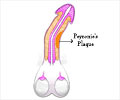An over-supply of a simple blood sugar could be a major cause of erectile dysfunction in diabetic men according to a new study. It has been found that one particular simple sugar, present in increased levels in diabetics O-GlcNAc, interferes with the chain of events needed to achieve and maintain erection and can lead to permanent penile impairment over time.
The findings could have valuable implications for new types of erectile dysfunction treatments targeting this mechanism of erection. The present study was targeted at finding whether high glucose in diabetes mellitus modifies the endothelial nitric oxide synthase (eNOS) enzyme, which is responsible for the achievement and maintenance of erection.Erectile dysfunction is a common problem for more than half of men with diabetes and about 50 percent to 75 percent of diabetic men have erectile dysfunction to some degree, [a rate] about threefold higher than in non-diabetic men. This is not the same type of erectile dysfunction seen in non-diabetics, and it is less effectively treated with conventional drugs like Viagra.
A study on rats has revealed that erection begins when a sexual stimulus activates the enzyme neuronal nitric oxide synthase (nNOS) that causes short-term release of nitric oxide (NO) at the nerve endings in the penis. This initial release of NO causes rapid and short-term increases in penile blood flow and short-term relaxation of the penile smooth muscle, initiating an erection.
The resulting expansion of penile blood vessels and smooth-muscle relaxation allows more blood to flow into the penis. This increased blood flow (shear stress) activates the eNOS in penile blood vessels causing sustained NO release, continued relaxation and full erection.
O-GlcNAc hinders this normal chain of events by inhibiting the activation of eNOS, and consequently reducing the release of NO and preventing the smooth muscle in the penis from relaxing. Without this relaxation, there is no shear stress to stoke the production of more NO and therefore, no normal, sustained erection.
This information not only asserts the physiological relevance of hyperglycemia and how it affects erection but also provides insights into vascular disease using erection as a model.











